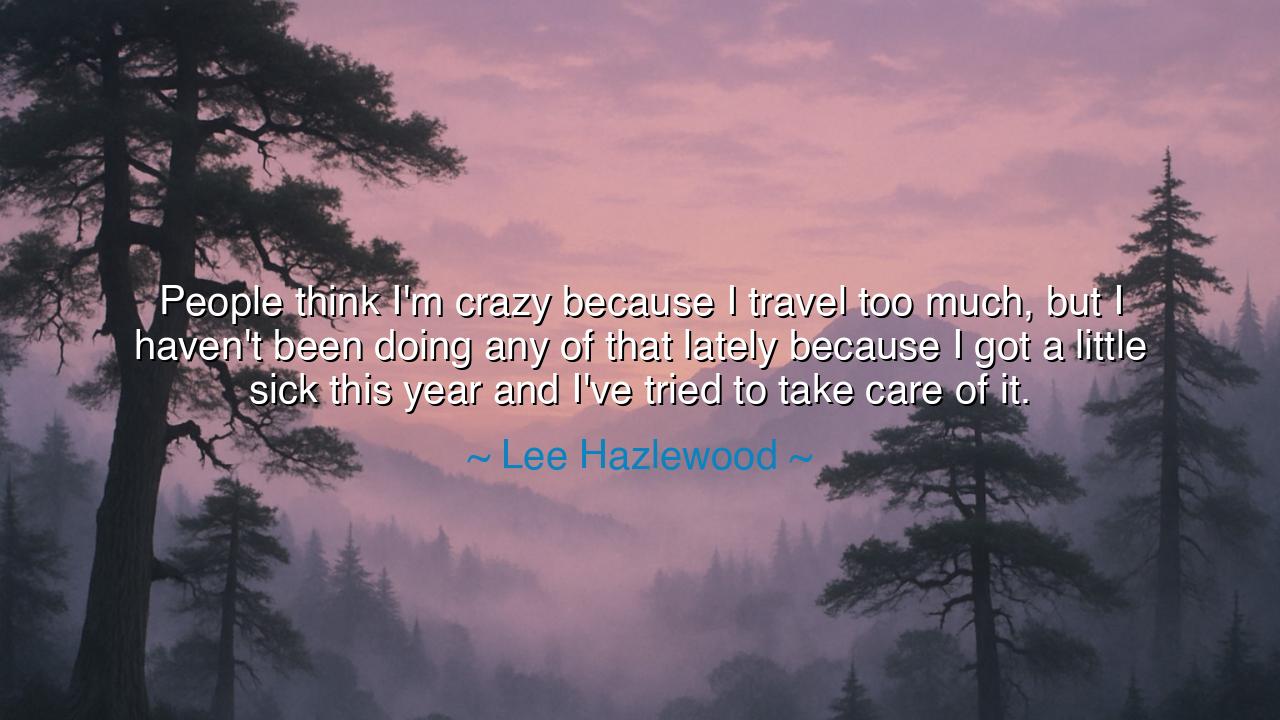
People think I'm crazy because I travel too much, but I haven't
People think I'm crazy because I travel too much, but I haven't been doing any of that lately because I got a little sick this year and I've tried to take care of it.






So spoke Lee Hazlewood, singer, poet, and wanderer of roads, when he confessed with candor: “People think I’m crazy because I travel too much, but I haven’t been doing any of that lately because I got a little sick this year and I’ve tried to take care of it.” In these words we hear not only the reflection of a man known for restlessness and song, but the ancient struggle of every human soul—the tension between the thirst for adventure and the demand of the body for rest.
To travel endlessly is to live in motion, to gather stories and to embrace the endless unfolding of the world. Hazlewood’s life was marked by this wanderer’s spirit, the refusal to be caged by one place or one rhythm. Yet he admits that even the most fiery spirit is housed in fragile flesh. The sickness that touched him became a reminder that one cannot outrun the needs of the body. What others called crazy was for him a way of living fully, but even the strongest must pause when life commands it.
The ancients knew well this truth. Consider Alexander the Great, who conquered lands from Greece to India. He lived as though he could not stop, always reaching for the next horizon. Yet in Babylon, at the age of thirty-two, sickness laid him low, and all his vast travels ceased. History remembers him as mighty, yet his end reminds us that no amount of conquest or movement can escape the limits of flesh. Hazlewood’s words echo this same sobering wisdom: that the wanderer must, at times, return home to tend his health.
And yet, in the balance of his statement, we hear no despair but acceptance. He does not renounce his travel or deny the joy it brought him; he only acknowledges that there is a season for every pursuit. The wise learn to read the seasons of life. There is a time for movement and a time for stillness, a time for bold journeys and a time for quiet healing. To know when to act and when to rest is the mark of true wisdom.
There is also in his words a subtle defiance. To be called crazy for following one’s passion is often the mark of those who live authentically. Many who remain bound by convention look with suspicion at those who dare to live differently. Hazlewood embraced the label, for in his restlessness lay truth, art, and music. But when illness came, he did not cling stubbornly to pride—he adapted. This humility, joined with passion, reveals the full measure of his wisdom.
The lesson for us is plain: do not let the judgments of others bind your spirit, nor let your passions blind you to the care of your own body. Walk boldly in your calling, even if others call it foolishness. But when your strength falters, do not scorn the pause—use it for healing, for reflection, for renewal. The journey is long, and those who honor their health may travel farther in the end than those who burn themselves too quickly.
Practically, this means living in balance. Pursue what you love, even if the world calls you crazy, but listen to the whispers of your body and soul. Rest when weary, seek healing when sick, and never despise the quiet seasons. For in them, new strength is born. Then, when the road calls again, you may rise renewed, ready to wander once more with vigor.
Thus, Hazlewood’s confession becomes a timeless teaching: “People think I’m crazy because I travel too much… but I’ve tried to take care of it.” Passion and rest, fire and calm, movement and stillness—all must walk together. Remember this, and you will not only live fully, but wisely, enduring long enough to see many journeys through to their end.






AAdministratorAdministrator
Welcome, honored guests. Please leave a comment, we will respond soon